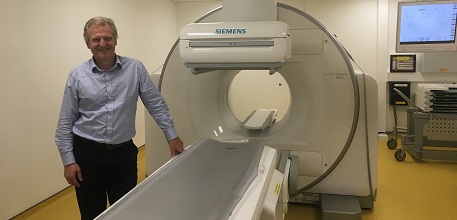
A revolutionary new treatment for blood cancers pioneered at Southampton is a step closer to becoming realised thanks to a major investment into its development.
Fewer side effects
The treatment marks a step change in the way bone marrow transplants – the main treatment for many blood cancers – are carried out. It means patients are spared the usual severe side effects associated with chemotherapy and total body radiation (TBI) normally used in preparing patients for bone marrow transplants, such as sickness, infection and hair loss.
It could be life-changing for the thousands of patients who undergo transplant procedures every year in the UK. In 2018 there were 4,487 such procedures, 180 of which were performed in Southampton.
The technique involves high doses of radiation targeted directly at bone marrow. It has been more than 10 years in the making, led by Dr Kim Orchard, Senior Lecturer and Consultant Haematologist at University Hospital Southampton and Director of the Wessex Blood and Marrow Transplant Programme.
Dr Orchard said: “It represents a step change in the way we deliver transplants, and we have yet to explore the full potential of this technology. It will be a very positive development for patients receiving bone marrow transplants, particularly if we are able to avoid long term toxicity that current treatment causes, especially in younger patients.”
Targeted treatment
The treatment uses radiation attached to an antibody, which is injected intravenously and targets cells within the bone marrow, delivering the radiation directly to sites of disease.
Dr Orchard has run three trials to date, with amyloidosis, leukaemia, and myeloma patients. A Phase I trial on amyloidosis (a disease, often treated with chemotherapy and bone marrow transplants, in which abnormal proteins build up in organs) ran for three years with nine patients taking part. It was carried out in collaboration with University College London Hospital (UCLH), Queen Elizabeth Hospital Birmingham and Newcastle’s Royal Victoria Infirmary. Some patients showed a ‘complete response’ to the transplant using the radiolabelled alone. The results were extremely encouraging for a Phase I trial.
He has also been working in collaboration with Great Ormond Street Hospital (GOSH) and UCLH on a trial for children with leukaemia undergoing bone morrow transplants and a phase I trial has been completed with very encouraging results. A Phase II trial for 35 children with high risk haematological cancers will start in early 2021.
“In Phase I and II trials we have shown an effective delivery of high doses of radiation that avoids the toxicity normally associated with chemotherapy and TBI,” said Dr Orchard. “All patients were extremely well throughout treatment, which is unheard of. Normally, patients undergoing a transplant become very unwell – we can potentially avoid these side-effects by using this treatment.”
He added: “The work in Southampton has been a true collaboration between the University of Southampton and several departments and the Trust, all contributing expertise and enthusiasm. This would not have been possible without the teams in Nuclear Medicine, Medical Physics and Radiopharmacy.”
Investment boost
Dr Orchard works closely with TheraPharm, a Swiss-German biotechnology company, which provides the antibodies that are then adapted in Southampton for the treatment. Last month, Australian-headquartered Telix Pharmaceuticals bought TheraPharm for a $10.2 million upfront investment, plus three milestone payments.
Dr Orchard explained: “Until now, our trials have been supported by Blood Cancer UK and the Wessex Cancer Trust. Telix’s support will enable us to scale up to carry out larger scale trials with the ultimate aim to move the treatment through regulatory approval so it can be realised for blood cancer patients.”
Posted on Wednesday 16 December 2020